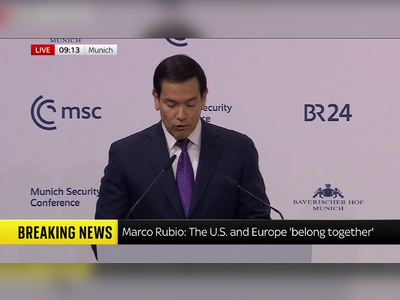Escalating Conflicts and Political Tensions: A Global Rundown from Beirut to Washington
Hezbollah commander Ibrahim Aqil's funeral amidst rising tensions with Israel and international calls for ceasefire.
Hezbollah supporters gathered in Beirut's southern suburbs on Sunday for the funeral of commander Ibrahim Aqil, killed in an Israeli air strike, amidst heightened tensions with Israel. Aqil, praised as "one of its great leaders," was the head of Hezbollah's elite Radwan unit and on a US sanctions list. The event saw tight security and strong loyalty to the Iran-backed group.
Meanwhile, in Israel, Haifa’s residents are on high alert due to escalating Hezbollah rocket fire from Lebanon, targeting northern towns. Residents like retiree Ilan Ravor are seeking shelter and stocking up on essentials, reflecting on the stark reality of this long-standing threat that escalated post-Hamas’s October 7 attack. Despite a sense of resigned familiarity, vigilance remains high.
Shifting to North Africa, hundreds of Tunisians protested on Sunday against President Kais Saied’s alleged authoritarianism ahead of the October 6 presidential election. A proposed bill to strip the administrative court of its authority over electoral disputes has sparked concerns about election integrity, escalating political tensions after the disqualification of prominent opposition candidates.
In the United States, House Republican Speaker Mike Johnson proposed a three-month stopgap funding bill on September 23, 2024, excluding a key Trump-requested immigration measure. This bill, extending funding through December 20 and including $231 million for Secret Service operations, has gained support from Democratic Senate Majority Leader Chuck Schumer and is set for a vote on Wednesday. It aims to avert a government shutdown.
As the tensions between Israel and Hezbollah rise, both parties have threatened to escalate their cross-border conflict. Israeli Prime Minister Benjamin Netanyahu affirmed that Israel delivered unprecedented strikes against Hezbollah and Hezbollah’s deputy chief Naim Qassem declared a "new phase" in their battle. International calls, led by the United States and the UN, are urging for a ceasefire to prevent a wider conflict amid significant casualties and displacements.
Finally, in Sudan, the city of El-Fasher is experiencing devastation from a deadly conflict, with the UN describing a recent "full-scale assault" by the Rapid Support Forces (RSF). Since April 2023, the conflict has caused tens of thousands of deaths and the displacement of over 10 million people, prompting urgent calls for a ceasefire and humanitarian access from the UN and U.S. President Joe Biden, who urges Sudan’s generals to re-engage in negotiations.
Meanwhile, in Israel, Haifa’s residents are on high alert due to escalating Hezbollah rocket fire from Lebanon, targeting northern towns. Residents like retiree Ilan Ravor are seeking shelter and stocking up on essentials, reflecting on the stark reality of this long-standing threat that escalated post-Hamas’s October 7 attack. Despite a sense of resigned familiarity, vigilance remains high.
Shifting to North Africa, hundreds of Tunisians protested on Sunday against President Kais Saied’s alleged authoritarianism ahead of the October 6 presidential election. A proposed bill to strip the administrative court of its authority over electoral disputes has sparked concerns about election integrity, escalating political tensions after the disqualification of prominent opposition candidates.
In the United States, House Republican Speaker Mike Johnson proposed a three-month stopgap funding bill on September 23, 2024, excluding a key Trump-requested immigration measure. This bill, extending funding through December 20 and including $231 million for Secret Service operations, has gained support from Democratic Senate Majority Leader Chuck Schumer and is set for a vote on Wednesday. It aims to avert a government shutdown.
As the tensions between Israel and Hezbollah rise, both parties have threatened to escalate their cross-border conflict. Israeli Prime Minister Benjamin Netanyahu affirmed that Israel delivered unprecedented strikes against Hezbollah and Hezbollah’s deputy chief Naim Qassem declared a "new phase" in their battle. International calls, led by the United States and the UN, are urging for a ceasefire to prevent a wider conflict amid significant casualties and displacements.
Finally, in Sudan, the city of El-Fasher is experiencing devastation from a deadly conflict, with the UN describing a recent "full-scale assault" by the Rapid Support Forces (RSF). Since April 2023, the conflict has caused tens of thousands of deaths and the displacement of over 10 million people, prompting urgent calls for a ceasefire and humanitarian access from the UN and U.S. President Joe Biden, who urges Sudan’s generals to re-engage in negotiations.


